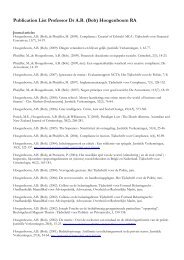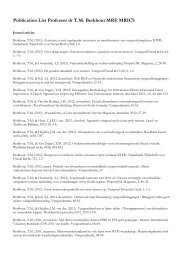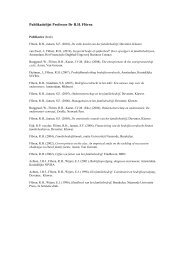Essays on supplier responsiveness and buyer firm value - Nyenrode ...
Essays on supplier responsiveness and buyer firm value - Nyenrode ...
Essays on supplier responsiveness and buyer firm value - Nyenrode ...
You also want an ePaper? Increase the reach of your titles
YUMPU automatically turns print PDFs into web optimized ePapers that Google loves.
collectivist culture <strong>and</strong> a C<strong>on</strong>fucian <strong>value</strong> system (Hofstede, 2003). These cultural<br />
differences result in different risk preferences in individual members of society. For<br />
instance, the Chinese have a greater risk preference than Americans, because their<br />
collectivist culture cushi<strong>on</strong>s them from losses. Future researchers could investigate how<br />
<strong>firm</strong>s from societies with extremely different risk preferences react to <strong>supplier</strong><br />
resp<strong>on</strong>siveness. This would also add a new dimensi<strong>on</strong> to the problem we studied as to<br />
whether cultural risk preference is a moderating factor in the <strong>supplier</strong> resp<strong>on</strong>siveness <strong>and</strong><br />
<strong>buyer</strong> performance relati<strong>on</strong>ship.<br />
In some Eurasian <strong>and</strong> Asian ec<strong>on</strong>omies, relati<strong>on</strong>al practices such as Blat <strong>and</strong><br />
Gaunxi are an integral part of the business culture. However, in western cultures such<br />
practices may be viewed as unethical <strong>and</strong> detrimental to the corporate interests <strong>and</strong><br />
reputati<strong>on</strong>. Specifically, when forming strategic <strong>supplier</strong> relati<strong>on</strong>ships with corporati<strong>on</strong>s<br />
that find such cultural practices acceptable, <strong>buyer</strong>s may fear a negative spillover <strong>on</strong> their<br />
br<strong>and</strong> reputati<strong>on</strong>. Such cultural effects have been overlooked in our current study. Further<br />
examples include questi<strong>on</strong>s such as: Does IdRR vary because of nati<strong>on</strong>al culture? Or<br />
should culture specific practices such as Blat or Guanxi be c<strong>on</strong>sidered a part of IdRR?<br />
ix) Use of both subjective <strong>and</strong> objective metrics for internati<strong>on</strong>al comparis<strong>on</strong>s. Another<br />
limitati<strong>on</strong> of our current study is that we <strong>on</strong>ly c<strong>on</strong>sidered percepti<strong>on</strong>s. Indeed, do<br />
percepti<strong>on</strong>s reinforce objective measures across cultures? Are some cultures more pr<strong>on</strong>e<br />
to be overly jubilant when it comes to redirecting earnings from investments? Are some<br />
cultures overly pessimistic when predicting losses which may across from strategic<br />
relati<strong>on</strong>ships? Do cultures influence the relative importance of <strong>firm</strong> percepti<strong>on</strong> of<br />
marketing strategies such as market orientati<strong>on</strong>?<br />
x) Role of <strong>firm</strong> culture: One course for future researchers could be to examine the<br />
role of <strong>firm</strong> culture in accepting subjective or objective measures as valid indicators of<br />
performance. This is important because it could also explain why resources are<br />
misdirected because of inaccurate percepti<strong>on</strong>s <strong>and</strong> their reliability as valid measurement<br />
tools.<br />
xi) Using department-level specific metrics: In the current study, we used<br />
corporate-level objective indicators. Using department-level specific metrics instead<br />
could res<strong>on</strong>ate better with managers' underst<strong>and</strong>ing of how much profit their departments<br />
produce. Indeed, there may not be much difference between objective <strong>and</strong> subjective<br />
measurement indicators at the same level throughout the organizati<strong>on</strong>.<br />
Closing Word<br />
This dissertati<strong>on</strong> has examined the role of strategic <strong>supplier</strong> resp<strong>on</strong>siveness in interorganizati<strong>on</strong>al<br />
risk reducti<strong>on</strong>, its influence <strong>on</strong> satisfacti<strong>on</strong>, <strong>supplier</strong> br<strong>and</strong> <strong>value</strong>, <strong>buyer</strong><br />
<strong>firm</strong> <strong>value</strong>, cross-cultural comparis<strong>on</strong>s, <strong>and</strong> the difference in evaluati<strong>on</strong>s based <strong>on</strong><br />
subjective <strong>and</strong> performance indicators. The true <strong>value</strong> of this research lies in its<br />
fundamental challenging of the link between <strong>supplier</strong> resp<strong>on</strong>siveness <strong>and</strong> organizati<strong>on</strong>al<br />
risk. To a degree, we have provided evidence that this link is negative <strong>and</strong> not positive as<br />
assumed by many prior studies. However, further research will c<strong>on</strong><strong>firm</strong> whether or not<br />
our findings can be applied in a wide variety of c<strong>on</strong>texts.<br />
127
















